Leadership Communication Report: Transformational Leader Analysis
VerifiedAdded on 2022/07/28
|8
|1781
|23
Report
AI Summary
This report analyzes the leadership communication of Rebecca Thomas, the CIO at PWC in New Zealand, as a transformational leader. It explores the definition of leadership communication and identifies the communication abilities that are crucial for effective leadership, such as maintaining an open-door policy and delegating proper communication across different management levels. The report also discusses the role of communication in a leader's success, highlighting how leaders use communication to create new strategies and adapt to changes. A rhetorical analysis is included to evaluate the leader's communication style. The conclusion emphasizes the importance of transformational leadership communication in motivating employees and overcoming business challenges, supported by relevant literature and analysis of the chosen leader's communication strategies.
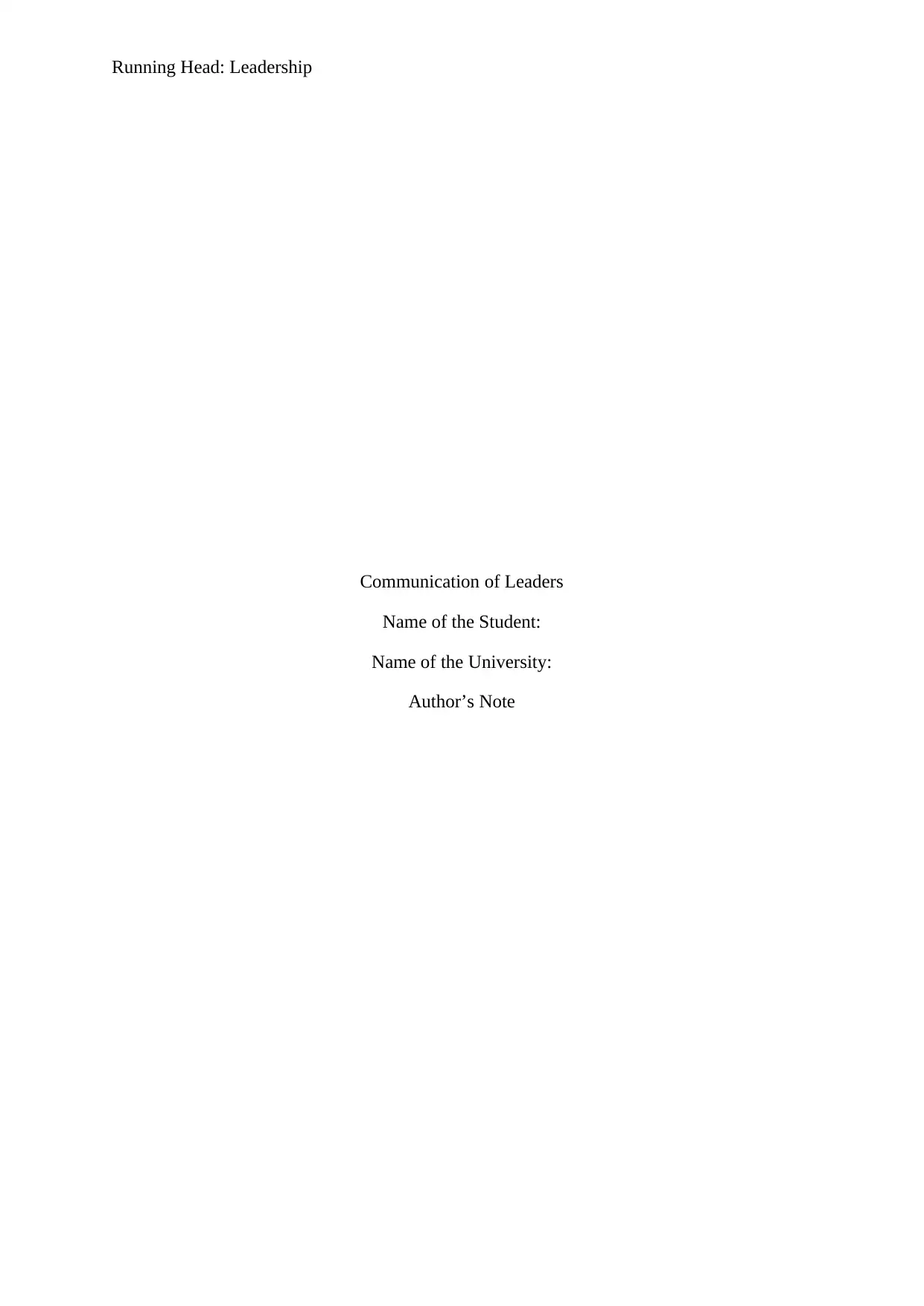
Running Head: Leadership
Communication of Leaders
Name of the Student:
Name of the University:
Author’s Note
Communication of Leaders
Name of the Student:
Name of the University:
Author’s Note
Paraphrase This Document
Need a fresh take? Get an instant paraphrase of this document with our AI Paraphraser
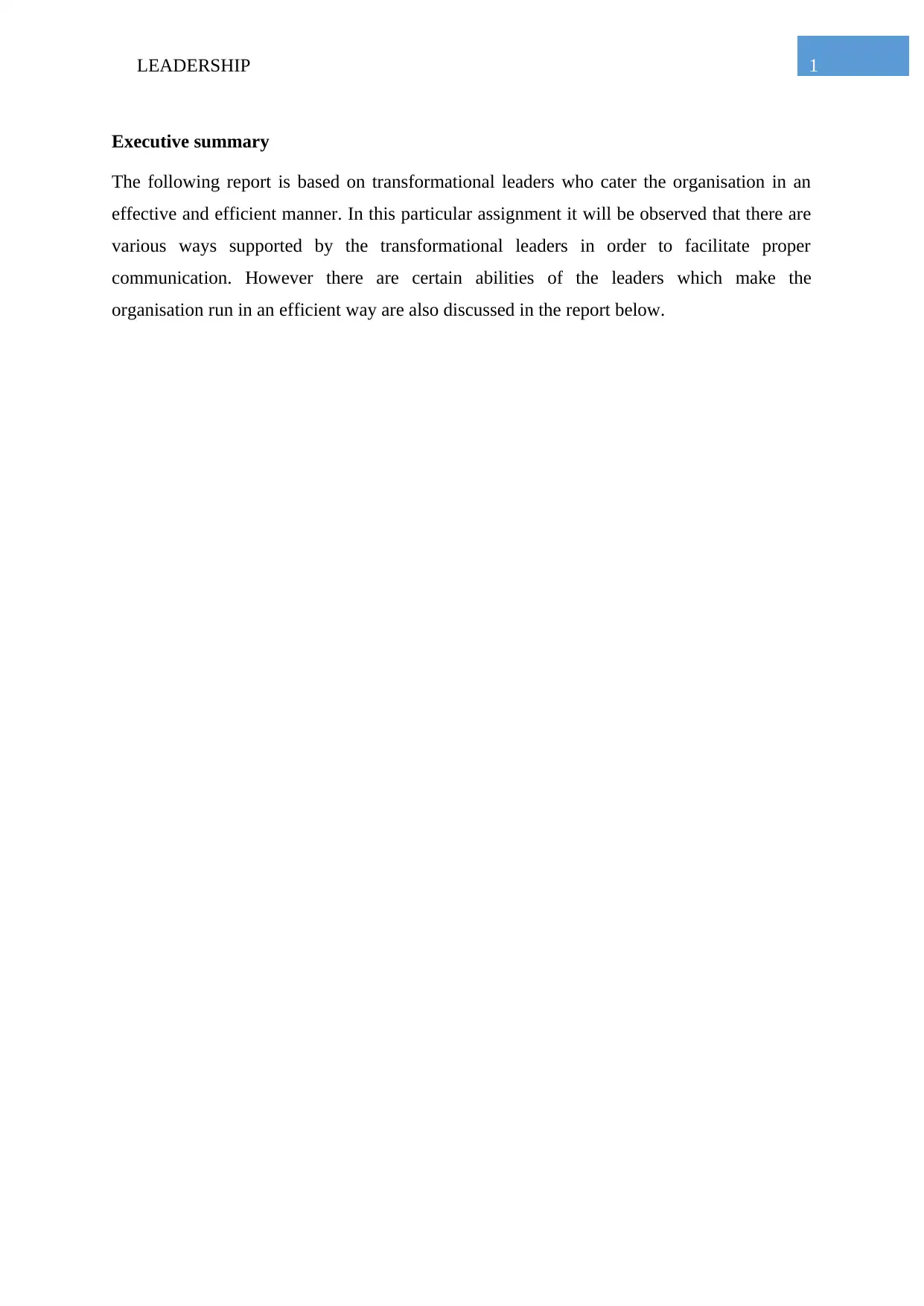
1LEADERSHIP
Executive summary
The following report is based on transformational leaders who cater the organisation in an
effective and efficient manner. In this particular assignment it will be observed that there are
various ways supported by the transformational leaders in order to facilitate proper
communication. However there are certain abilities of the leaders which make the
organisation run in an efficient way are also discussed in the report below.
Executive summary
The following report is based on transformational leaders who cater the organisation in an
effective and efficient manner. In this particular assignment it will be observed that there are
various ways supported by the transformational leaders in order to facilitate proper
communication. However there are certain abilities of the leaders which make the
organisation run in an efficient way are also discussed in the report below.
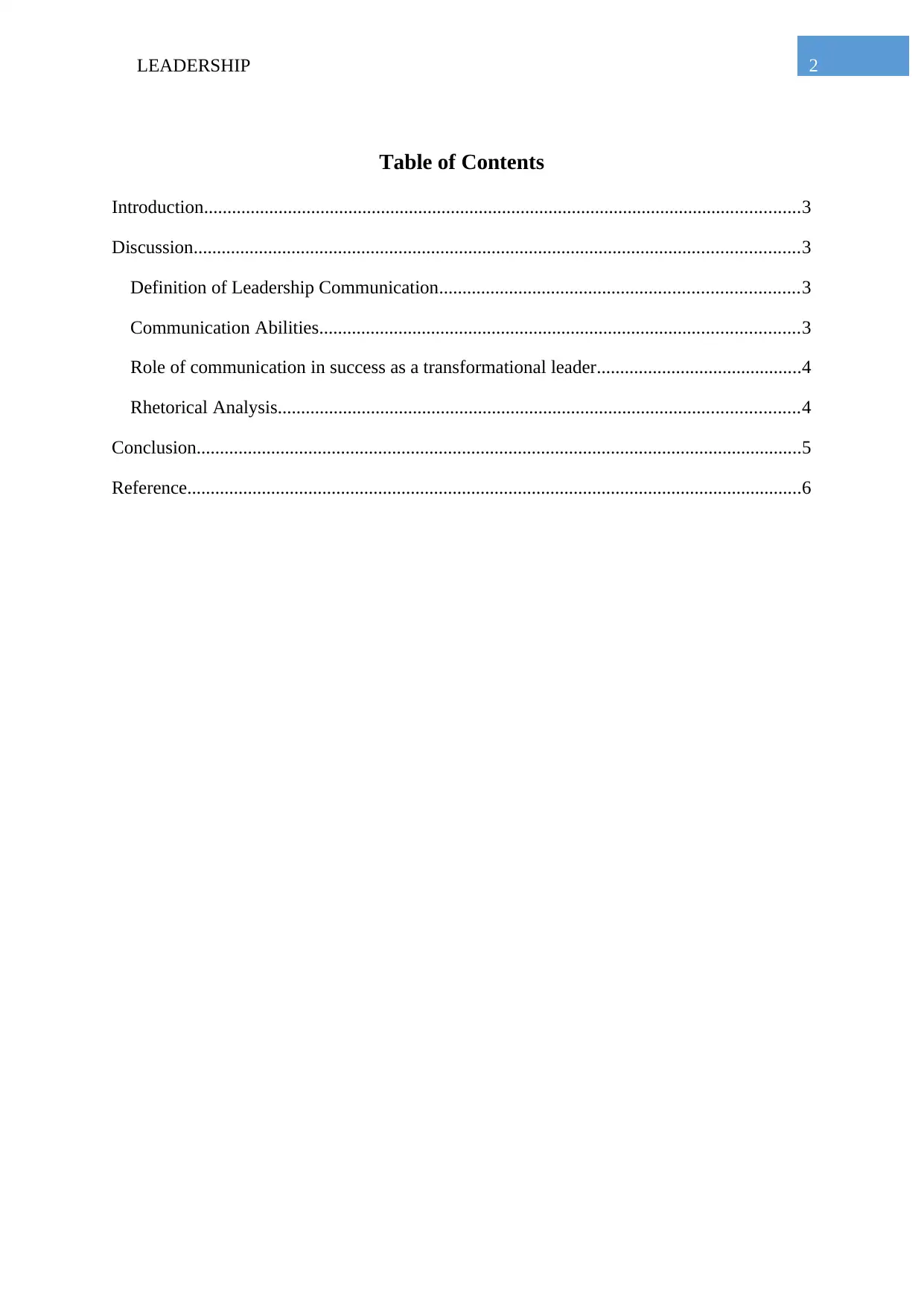
2LEADERSHIP
Table of Contents
Introduction................................................................................................................................3
Discussion..................................................................................................................................3
Definition of Leadership Communication.............................................................................3
Communication Abilities.......................................................................................................3
Role of communication in success as a transformational leader............................................4
Rhetorical Analysis................................................................................................................4
Conclusion..................................................................................................................................5
Reference....................................................................................................................................6
Table of Contents
Introduction................................................................................................................................3
Discussion..................................................................................................................................3
Definition of Leadership Communication.............................................................................3
Communication Abilities.......................................................................................................3
Role of communication in success as a transformational leader............................................4
Rhetorical Analysis................................................................................................................4
Conclusion..................................................................................................................................5
Reference....................................................................................................................................6
⊘ This is a preview!⊘
Do you want full access?
Subscribe today to unlock all pages.

Trusted by 1+ million students worldwide
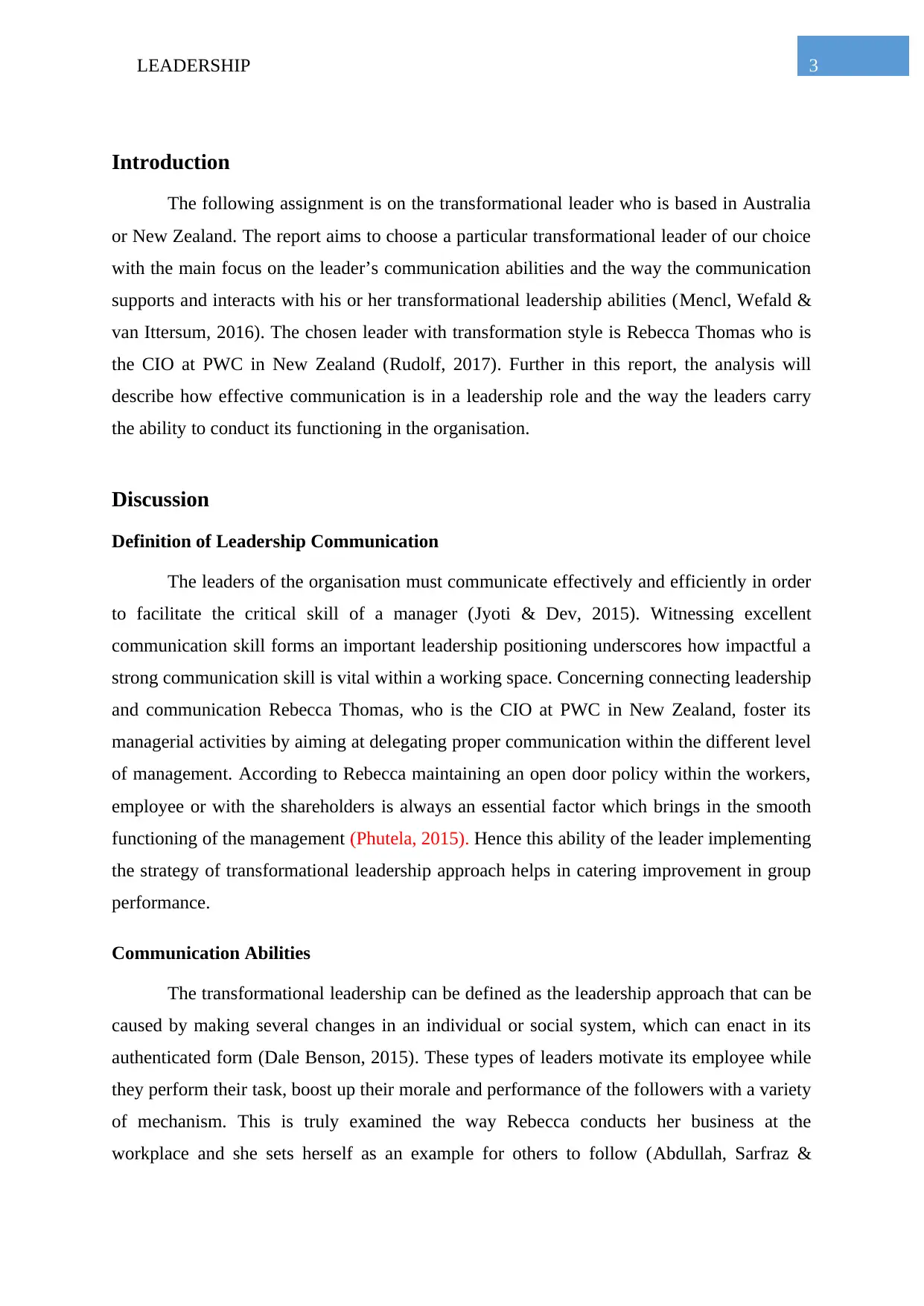
3LEADERSHIP
Introduction
The following assignment is on the transformational leader who is based in Australia
or New Zealand. The report aims to choose a particular transformational leader of our choice
with the main focus on the leader’s communication abilities and the way the communication
supports and interacts with his or her transformational leadership abilities (Mencl, Wefald &
van Ittersum, 2016). The chosen leader with transformation style is Rebecca Thomas who is
the CIO at PWC in New Zealand (Rudolf, 2017). Further in this report, the analysis will
describe how effective communication is in a leadership role and the way the leaders carry
the ability to conduct its functioning in the organisation.
Discussion
Definition of Leadership Communication
The leaders of the organisation must communicate effectively and efficiently in order
to facilitate the critical skill of a manager (Jyoti & Dev, 2015). Witnessing excellent
communication skill forms an important leadership positioning underscores how impactful a
strong communication skill is vital within a working space. Concerning connecting leadership
and communication Rebecca Thomas, who is the CIO at PWC in New Zealand, foster its
managerial activities by aiming at delegating proper communication within the different level
of management. According to Rebecca maintaining an open door policy within the workers,
employee or with the shareholders is always an essential factor which brings in the smooth
functioning of the management (Phutela, 2015). Hence this ability of the leader implementing
the strategy of transformational leadership approach helps in catering improvement in group
performance.
Communication Abilities
The transformational leadership can be defined as the leadership approach that can be
caused by making several changes in an individual or social system, which can enact in its
authenticated form (Dale Benson, 2015). These types of leaders motivate its employee while
they perform their task, boost up their morale and performance of the followers with a variety
of mechanism. This is truly examined the way Rebecca conducts her business at the
workplace and she sets herself as an example for others to follow (Abdullah, Sarfraz &
Introduction
The following assignment is on the transformational leader who is based in Australia
or New Zealand. The report aims to choose a particular transformational leader of our choice
with the main focus on the leader’s communication abilities and the way the communication
supports and interacts with his or her transformational leadership abilities (Mencl, Wefald &
van Ittersum, 2016). The chosen leader with transformation style is Rebecca Thomas who is
the CIO at PWC in New Zealand (Rudolf, 2017). Further in this report, the analysis will
describe how effective communication is in a leadership role and the way the leaders carry
the ability to conduct its functioning in the organisation.
Discussion
Definition of Leadership Communication
The leaders of the organisation must communicate effectively and efficiently in order
to facilitate the critical skill of a manager (Jyoti & Dev, 2015). Witnessing excellent
communication skill forms an important leadership positioning underscores how impactful a
strong communication skill is vital within a working space. Concerning connecting leadership
and communication Rebecca Thomas, who is the CIO at PWC in New Zealand, foster its
managerial activities by aiming at delegating proper communication within the different level
of management. According to Rebecca maintaining an open door policy within the workers,
employee or with the shareholders is always an essential factor which brings in the smooth
functioning of the management (Phutela, 2015). Hence this ability of the leader implementing
the strategy of transformational leadership approach helps in catering improvement in group
performance.
Communication Abilities
The transformational leadership can be defined as the leadership approach that can be
caused by making several changes in an individual or social system, which can enact in its
authenticated form (Dale Benson, 2015). These types of leaders motivate its employee while
they perform their task, boost up their morale and performance of the followers with a variety
of mechanism. This is truly examined the way Rebecca conducts her business at the
workplace and she sets herself as an example for others to follow (Abdullah, Sarfraz &
Paraphrase This Document
Need a fresh take? Get an instant paraphrase of this document with our AI Paraphraser
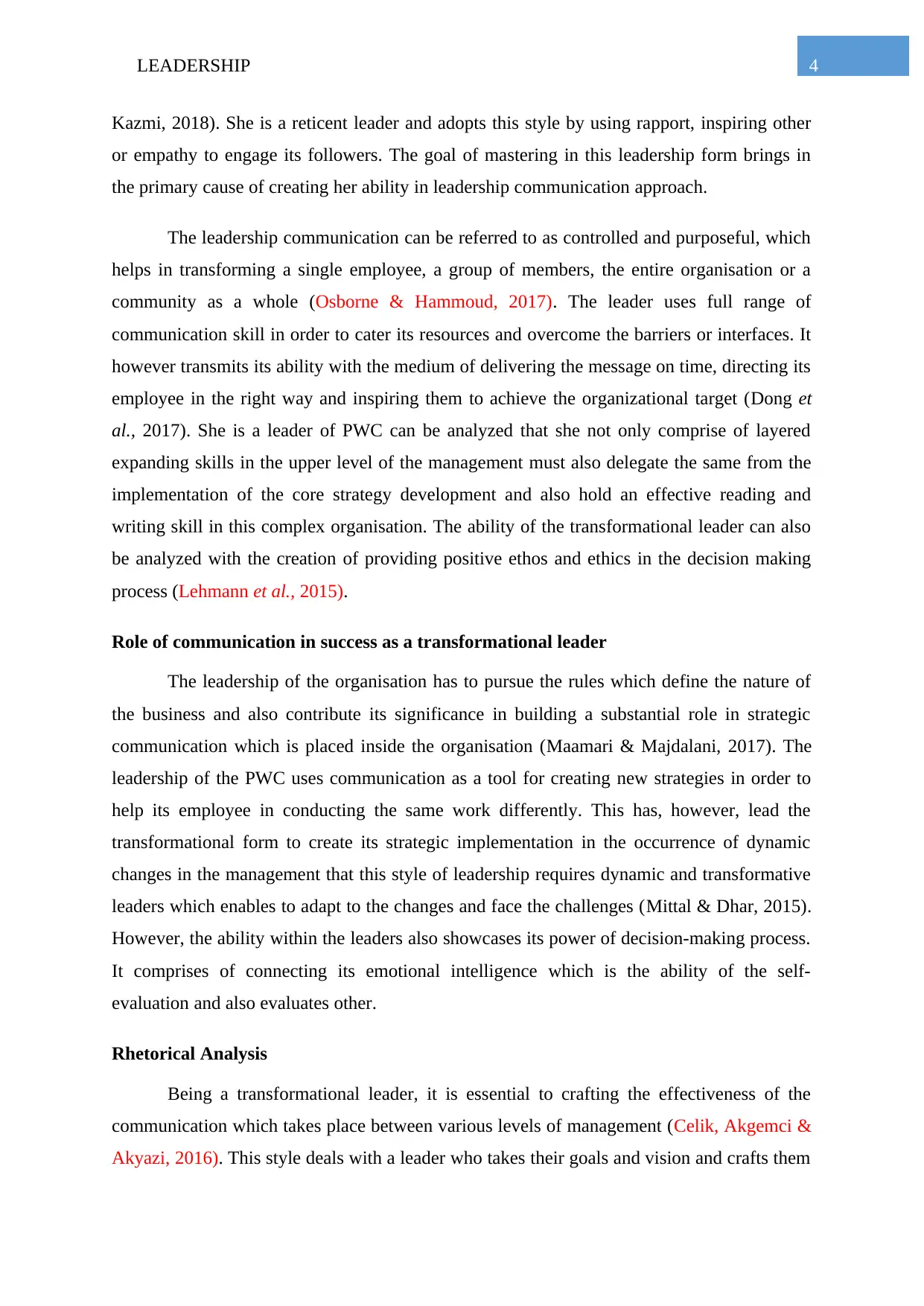
4LEADERSHIP
Kazmi, 2018). She is a reticent leader and adopts this style by using rapport, inspiring other
or empathy to engage its followers. The goal of mastering in this leadership form brings in
the primary cause of creating her ability in leadership communication approach.
The leadership communication can be referred to as controlled and purposeful, which
helps in transforming a single employee, a group of members, the entire organisation or a
community as a whole (Osborne & Hammoud, 2017). The leader uses full range of
communication skill in order to cater its resources and overcome the barriers or interfaces. It
however transmits its ability with the medium of delivering the message on time, directing its
employee in the right way and inspiring them to achieve the organizational target (Dong et
al., 2017). She is a leader of PWC can be analyzed that she not only comprise of layered
expanding skills in the upper level of the management must also delegate the same from the
implementation of the core strategy development and also hold an effective reading and
writing skill in this complex organisation. The ability of the transformational leader can also
be analyzed with the creation of providing positive ethos and ethics in the decision making
process (Lehmann et al., 2015).
Role of communication in success as a transformational leader
The leadership of the organisation has to pursue the rules which define the nature of
the business and also contribute its significance in building a substantial role in strategic
communication which is placed inside the organisation (Maamari & Majdalani, 2017). The
leadership of the PWC uses communication as a tool for creating new strategies in order to
help its employee in conducting the same work differently. This has, however, lead the
transformational form to create its strategic implementation in the occurrence of dynamic
changes in the management that this style of leadership requires dynamic and transformative
leaders which enables to adapt to the changes and face the challenges (Mittal & Dhar, 2015).
However, the ability within the leaders also showcases its power of decision-making process.
It comprises of connecting its emotional intelligence which is the ability of the self-
evaluation and also evaluates other.
Rhetorical Analysis
Being a transformational leader, it is essential to crafting the effectiveness of the
communication which takes place between various levels of management (Celik, Akgemci &
Akyazi, 2016). This style deals with a leader who takes their goals and vision and crafts them
Kazmi, 2018). She is a reticent leader and adopts this style by using rapport, inspiring other
or empathy to engage its followers. The goal of mastering in this leadership form brings in
the primary cause of creating her ability in leadership communication approach.
The leadership communication can be referred to as controlled and purposeful, which
helps in transforming a single employee, a group of members, the entire organisation or a
community as a whole (Osborne & Hammoud, 2017). The leader uses full range of
communication skill in order to cater its resources and overcome the barriers or interfaces. It
however transmits its ability with the medium of delivering the message on time, directing its
employee in the right way and inspiring them to achieve the organizational target (Dong et
al., 2017). She is a leader of PWC can be analyzed that she not only comprise of layered
expanding skills in the upper level of the management must also delegate the same from the
implementation of the core strategy development and also hold an effective reading and
writing skill in this complex organisation. The ability of the transformational leader can also
be analyzed with the creation of providing positive ethos and ethics in the decision making
process (Lehmann et al., 2015).
Role of communication in success as a transformational leader
The leadership of the organisation has to pursue the rules which define the nature of
the business and also contribute its significance in building a substantial role in strategic
communication which is placed inside the organisation (Maamari & Majdalani, 2017). The
leadership of the PWC uses communication as a tool for creating new strategies in order to
help its employee in conducting the same work differently. This has, however, lead the
transformational form to create its strategic implementation in the occurrence of dynamic
changes in the management that this style of leadership requires dynamic and transformative
leaders which enables to adapt to the changes and face the challenges (Mittal & Dhar, 2015).
However, the ability within the leaders also showcases its power of decision-making process.
It comprises of connecting its emotional intelligence which is the ability of the self-
evaluation and also evaluates other.
Rhetorical Analysis
Being a transformational leader, it is essential to crafting the effectiveness of the
communication which takes place between various levels of management (Celik, Akgemci &
Akyazi, 2016). This style deals with a leader who takes their goals and vision and crafts them
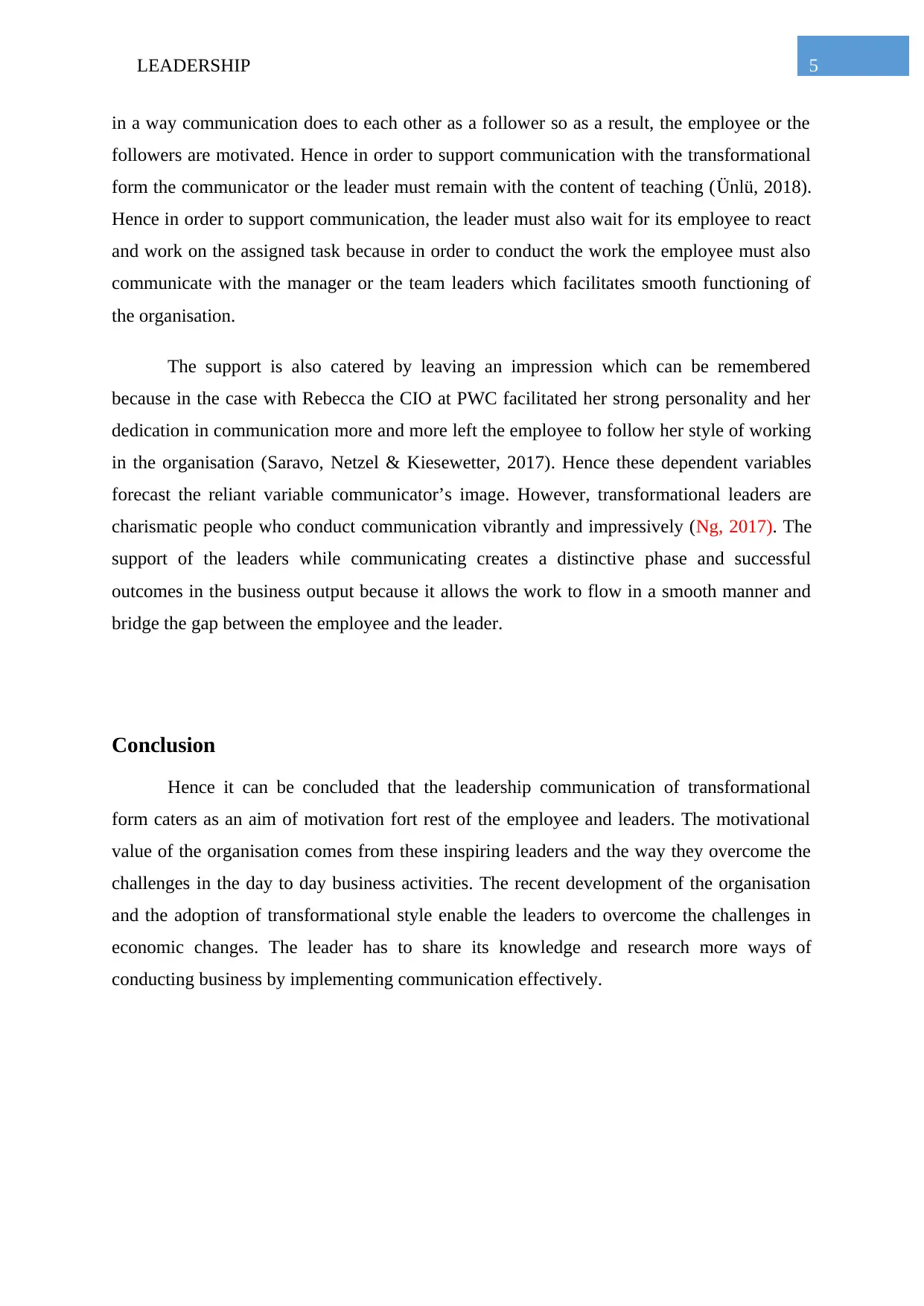
5LEADERSHIP
in a way communication does to each other as a follower so as a result, the employee or the
followers are motivated. Hence in order to support communication with the transformational
form the communicator or the leader must remain with the content of teaching (Ünlü, 2018).
Hence in order to support communication, the leader must also wait for its employee to react
and work on the assigned task because in order to conduct the work the employee must also
communicate with the manager or the team leaders which facilitates smooth functioning of
the organisation.
The support is also catered by leaving an impression which can be remembered
because in the case with Rebecca the CIO at PWC facilitated her strong personality and her
dedication in communication more and more left the employee to follow her style of working
in the organisation (Saravo, Netzel & Kiesewetter, 2017). Hence these dependent variables
forecast the reliant variable communicator’s image. However, transformational leaders are
charismatic people who conduct communication vibrantly and impressively (Ng, 2017). The
support of the leaders while communicating creates a distinctive phase and successful
outcomes in the business output because it allows the work to flow in a smooth manner and
bridge the gap between the employee and the leader.
Conclusion
Hence it can be concluded that the leadership communication of transformational
form caters as an aim of motivation fort rest of the employee and leaders. The motivational
value of the organisation comes from these inspiring leaders and the way they overcome the
challenges in the day to day business activities. The recent development of the organisation
and the adoption of transformational style enable the leaders to overcome the challenges in
economic changes. The leader has to share its knowledge and research more ways of
conducting business by implementing communication effectively.
in a way communication does to each other as a follower so as a result, the employee or the
followers are motivated. Hence in order to support communication with the transformational
form the communicator or the leader must remain with the content of teaching (Ünlü, 2018).
Hence in order to support communication, the leader must also wait for its employee to react
and work on the assigned task because in order to conduct the work the employee must also
communicate with the manager or the team leaders which facilitates smooth functioning of
the organisation.
The support is also catered by leaving an impression which can be remembered
because in the case with Rebecca the CIO at PWC facilitated her strong personality and her
dedication in communication more and more left the employee to follow her style of working
in the organisation (Saravo, Netzel & Kiesewetter, 2017). Hence these dependent variables
forecast the reliant variable communicator’s image. However, transformational leaders are
charismatic people who conduct communication vibrantly and impressively (Ng, 2017). The
support of the leaders while communicating creates a distinctive phase and successful
outcomes in the business output because it allows the work to flow in a smooth manner and
bridge the gap between the employee and the leader.
Conclusion
Hence it can be concluded that the leadership communication of transformational
form caters as an aim of motivation fort rest of the employee and leaders. The motivational
value of the organisation comes from these inspiring leaders and the way they overcome the
challenges in the day to day business activities. The recent development of the organisation
and the adoption of transformational style enable the leaders to overcome the challenges in
economic changes. The leader has to share its knowledge and research more ways of
conducting business by implementing communication effectively.
⊘ This is a preview!⊘
Do you want full access?
Subscribe today to unlock all pages.

Trusted by 1+ million students worldwide
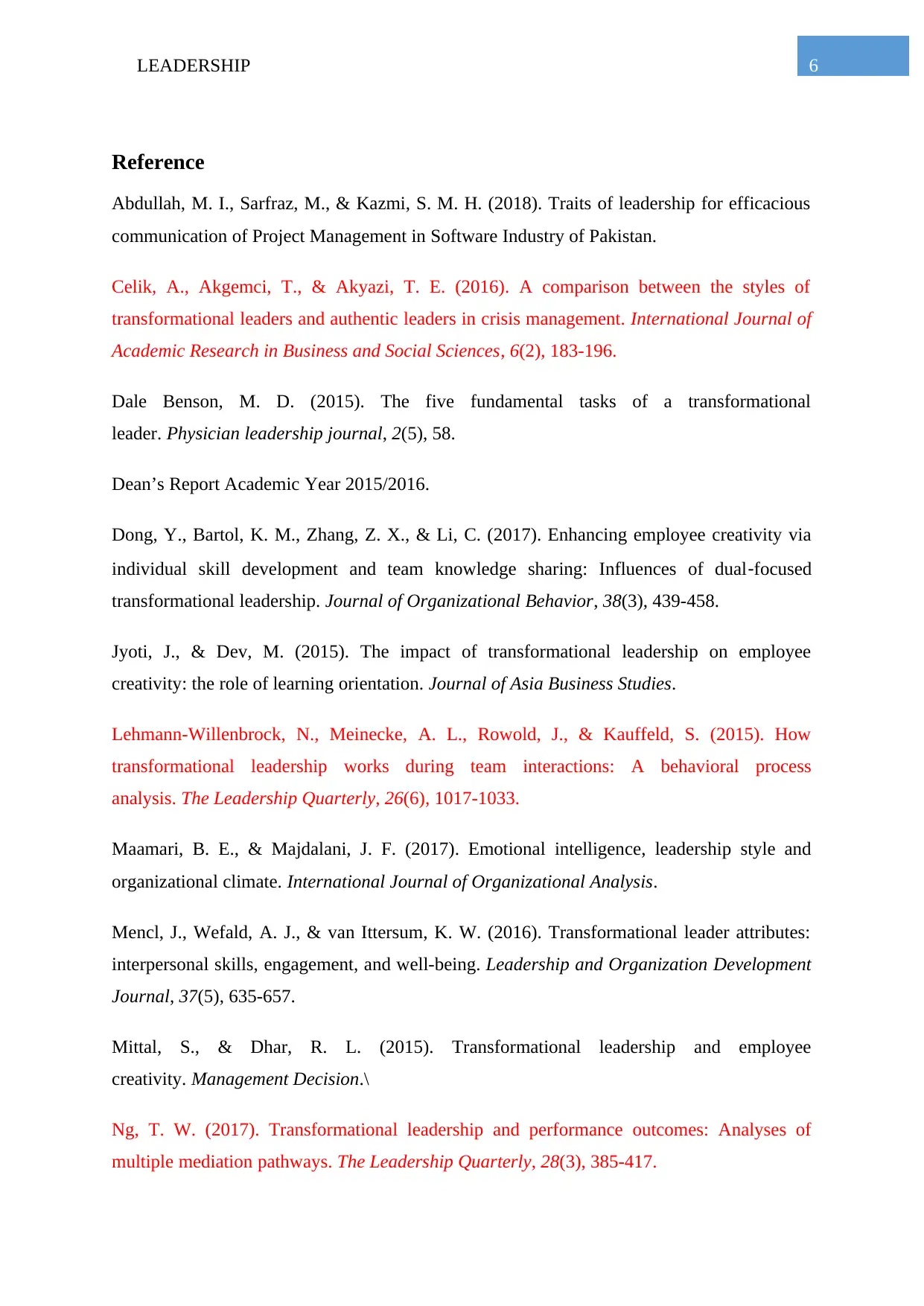
6LEADERSHIP
Reference
Abdullah, M. I., Sarfraz, M., & Kazmi, S. M. H. (2018). Traits of leadership for efficacious
communication of Project Management in Software Industry of Pakistan.
Celik, A., Akgemci, T., & Akyazi, T. E. (2016). A comparison between the styles of
transformational leaders and authentic leaders in crisis management. International Journal of
Academic Research in Business and Social Sciences, 6(2), 183-196.
Dale Benson, M. D. (2015). The five fundamental tasks of a transformational
leader. Physician leadership journal, 2(5), 58.
Dean’s Report Academic Year 2015/2016.
Dong, Y., Bartol, K. M., Zhang, Z. X., & Li, C. (2017). Enhancing employee creativity via
individual skill development and team knowledge sharing: Influences of dual‐focused
transformational leadership. Journal of Organizational Behavior, 38(3), 439-458.
Jyoti, J., & Dev, M. (2015). The impact of transformational leadership on employee
creativity: the role of learning orientation. Journal of Asia Business Studies.
Lehmann-Willenbrock, N., Meinecke, A. L., Rowold, J., & Kauffeld, S. (2015). How
transformational leadership works during team interactions: A behavioral process
analysis. The Leadership Quarterly, 26(6), 1017-1033.
Maamari, B. E., & Majdalani, J. F. (2017). Emotional intelligence, leadership style and
organizational climate. International Journal of Organizational Analysis.
Mencl, J., Wefald, A. J., & van Ittersum, K. W. (2016). Transformational leader attributes:
interpersonal skills, engagement, and well-being. Leadership and Organization Development
Journal, 37(5), 635-657.
Mittal, S., & Dhar, R. L. (2015). Transformational leadership and employee
creativity. Management Decision.\
Ng, T. W. (2017). Transformational leadership and performance outcomes: Analyses of
multiple mediation pathways. The Leadership Quarterly, 28(3), 385-417.
Reference
Abdullah, M. I., Sarfraz, M., & Kazmi, S. M. H. (2018). Traits of leadership for efficacious
communication of Project Management in Software Industry of Pakistan.
Celik, A., Akgemci, T., & Akyazi, T. E. (2016). A comparison between the styles of
transformational leaders and authentic leaders in crisis management. International Journal of
Academic Research in Business and Social Sciences, 6(2), 183-196.
Dale Benson, M. D. (2015). The five fundamental tasks of a transformational
leader. Physician leadership journal, 2(5), 58.
Dean’s Report Academic Year 2015/2016.
Dong, Y., Bartol, K. M., Zhang, Z. X., & Li, C. (2017). Enhancing employee creativity via
individual skill development and team knowledge sharing: Influences of dual‐focused
transformational leadership. Journal of Organizational Behavior, 38(3), 439-458.
Jyoti, J., & Dev, M. (2015). The impact of transformational leadership on employee
creativity: the role of learning orientation. Journal of Asia Business Studies.
Lehmann-Willenbrock, N., Meinecke, A. L., Rowold, J., & Kauffeld, S. (2015). How
transformational leadership works during team interactions: A behavioral process
analysis. The Leadership Quarterly, 26(6), 1017-1033.
Maamari, B. E., & Majdalani, J. F. (2017). Emotional intelligence, leadership style and
organizational climate. International Journal of Organizational Analysis.
Mencl, J., Wefald, A. J., & van Ittersum, K. W. (2016). Transformational leader attributes:
interpersonal skills, engagement, and well-being. Leadership and Organization Development
Journal, 37(5), 635-657.
Mittal, S., & Dhar, R. L. (2015). Transformational leadership and employee
creativity. Management Decision.\
Ng, T. W. (2017). Transformational leadership and performance outcomes: Analyses of
multiple mediation pathways. The Leadership Quarterly, 28(3), 385-417.
Paraphrase This Document
Need a fresh take? Get an instant paraphrase of this document with our AI Paraphraser
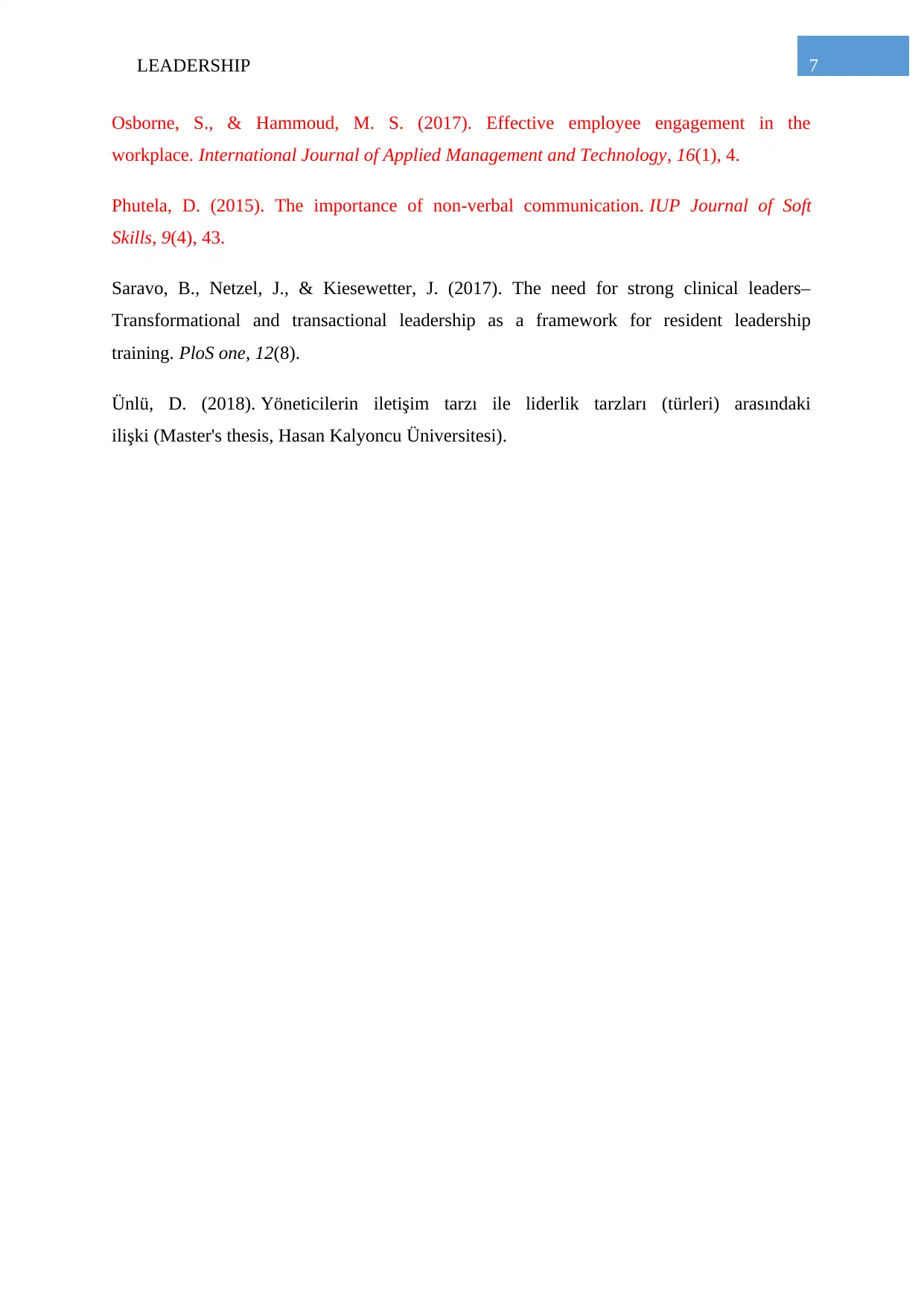
7LEADERSHIP
Osborne, S., & Hammoud, M. S. (2017). Effective employee engagement in the
workplace. International Journal of Applied Management and Technology, 16(1), 4.
Phutela, D. (2015). The importance of non-verbal communication. IUP Journal of Soft
Skills, 9(4), 43.
Saravo, B., Netzel, J., & Kiesewetter, J. (2017). The need for strong clinical leaders–
Transformational and transactional leadership as a framework for resident leadership
training. PloS one, 12(8).
Ünlü, D. (2018). Yöneticilerin iletişim tarzı ile liderlik tarzları (türleri) arasındaki
ilişki (Master's thesis, Hasan Kalyoncu Üniversitesi).
Osborne, S., & Hammoud, M. S. (2017). Effective employee engagement in the
workplace. International Journal of Applied Management and Technology, 16(1), 4.
Phutela, D. (2015). The importance of non-verbal communication. IUP Journal of Soft
Skills, 9(4), 43.
Saravo, B., Netzel, J., & Kiesewetter, J. (2017). The need for strong clinical leaders–
Transformational and transactional leadership as a framework for resident leadership
training. PloS one, 12(8).
Ünlü, D. (2018). Yöneticilerin iletişim tarzı ile liderlik tarzları (türleri) arasındaki
ilişki (Master's thesis, Hasan Kalyoncu Üniversitesi).
1 out of 8
Related Documents
Your All-in-One AI-Powered Toolkit for Academic Success.
+13062052269
info@desklib.com
Available 24*7 on WhatsApp / Email
![[object Object]](/_next/static/media/star-bottom.7253800d.svg)
Unlock your academic potential
Copyright © 2020–2026 A2Z Services. All Rights Reserved. Developed and managed by ZUCOL.




